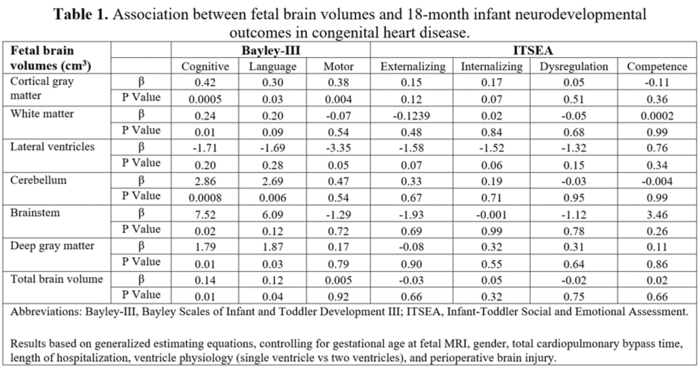DENVER, April 22, 2022 – A new study reports that selective impairments in regional fetal brain growth predict adverse cognitive, language and motor outcomes in infants with congenital heart disease. Interestingly, larger fetal ventricular volumes were associated with early autistic features. Findings from the study will be presented during the Pediatric Academic Societies (PAS) 2022 Meeting, taking place April 21-25 in Denver.

Credit: Children’s National Hospital
DENVER, April 22, 2022 – A new study reports that selective impairments in regional fetal brain growth predict adverse cognitive, language and motor outcomes in infants with congenital heart disease. Interestingly, larger fetal ventricular volumes were associated with early autistic features. Findings from the study will be presented during the Pediatric Academic Societies (PAS) 2022 Meeting, taking place April 21-25 in Denver.
Fetuses with complex congenital heart disease are at heightened risk for impaired prenatal brain development. However, the relationship between altered in-utero fetal brain growth and infant neurodevelopmental outcomes in congenital heart disease remains largely unknown.
The study found that infants with single-ventricle congenital heart disease showed greater susceptibility to social-emotional problems compared to those with two-ventricle congenital heart disease. These data suggest that prenatal brain growth impairments serve as an important biomarker for later neurodevelopmental dysfunction.
“Congenital heart defects are the most common birth defect, and many babies undergo their first surgery shortly after birth,” said Yao Wu, Ph.D., Developing Brain Institute research faculty and lead author of the study. “Thanks to modern medicine, many of these children are not only surviving; they’re thriving. That makes it all the more important to understand whether delayed fetal brain development during pregnancy may affect these children’s neurodevelopment as they grow older. Our research team enrolled 186 fetuses with heart lesions in this study, using sophisticated imaging to answer that question. In this study we show that impaired brain growth in the womb can predict worsened language, cognitive and motor outcomes by the time infants are 18 months old.”
Catherine Limperopoulos, Ph.D., Developing Brain Institute chief and director and senior author of the study added: “By the time children who survive a fetal congenital heart disease diagnosis enter school, they can experience impaired social and communication skills, as well as difficulty with decision-making and paying attention. Our study adds to the growing body of evidence that points to the need to identify early preventive and/or therapeutic strategies to offset these neurodevelopmental delays so these children live longer, healthier lives.”
Dr. Wu will present “Impaired Prenatal Brain Growth Predicts Adverse Neurodevelopmental Outcomes in Infants With Congenital Heart Disease” on Saturday, April 23 at 10 a.m. MDT. Reporters interested in an interview with Dr. Wu should contact [email protected].
The PAS Meeting connects thousands of pediatricians and other health care providers worldwide. For more information about the PAS Meeting, please visit www.pas-meeting.org.
###
About the Pediatric Academic Societies Meeting
The Pediatric Academic Societies (PAS) Meeting is the premier North American scholarly child health meeting. The PAS Meeting connects thousands of pediatricians and other health care providers worldwide. The PAS Meeting is produced through a partnership of four pediatric organizations that are leaders in the advancement of pediatric research and child advocacy: American Pediatric Society, Society for Pediatric Research, Academic Pediatric Association and American Academy of Pediatrics. For more information, please visit www.pas-meeting.org. Follow us on Twitter @PASMeeting, Instagram PASMeeting and #PAS2022, and like us on Facebook PASMeeting.
—
Abstract: Impaired Prenatal Brain Growth Predicts Adverse Neurodevelopmental Outcomes in Infants With Congenital Heart Disease
Topic
Cardiology
Presenting Author
Yao Wu, PhD
Organization
Children’s National Hospital
Background
Fetuses with complex congenital heart disease (CHD) are at heightened risk for impaired prenatal brain development. However, the relationship between altered in-utero fetal brain growth and infant neurodevelopmental outcomes in CHD remains largely unknown.
Objective
To determine the association between fetal brain volumes and infant neurodevelopment in CHD.
Design/Methods
We prospectively recruited women with pregnancies complicated by a fetal CHD diagnosis. Pregnant women underwent a fetal MRI on a GE 1.5T scanner using single shot fast spin echo acquisitions. Volumes of fetal total brain, cortical gray matter, white matter, deep gray matter, cerebellum, brainstem, and lateral ventricles were quantified. We completed the Bayley Scales of Infant and Toddler Development III, Infant-Toddler Social and Emotional Assessment, and Modified Checklist for Autism in Toddlers at 18 months of age. Generalized estimating equations were used to measure associations between fetal brain measures and infant neurodevelopmental outcomes.
Results
We enrolled 186 mother/baby dyads who underwent 250 fetal MRI studies between 20-39 gestational weeks. Of the 186 subjects, 77 had single-ventricle (SV) CHD and 109 had two-ventricle (2V) CHD. Forty-nine subjects died (9 prenatally; 8 preoperatively, 32 postoperatively). One hundred and thirty-three infants underwent neurodevelopmental testing at a mean age of 19.6 months. Decreased global, regional (cerebellum and brainstem) and tissue specific fetal brain volumes (cortical gray matter, white matter, deep gray matter) were associated with poorer infant cognitive performance. Decreased fetal cerebellum, cortical and deep gray matter volumes were associated with infant language deficits. Reduced prenatal cortical gray matter volume was associated with greater infant motor impairments. These associations remained significant after controlling for perioperative clinical factors (Table 1). Increased fetal lateral ventricular volume was associated with a positive autism screen. Infants with SV CHD had lower competence scores compared to 2V CHD.
Conclusion(s)
We report that selective impairments in regional fetal brain growth predict adverse cognitive, language and motor outcomes in CHD. Interestingly, larger fetal ventricular volumes were associated with early autistic features. Infants with SV CHD showed greater susceptibility to social-emotional problems compared to those with 2V CHD. These data suggest that prenatal brain growth impairments serve as an important biomarker for later neurodevelopmental dysfunction.
Tables and Images
Table 1. Association between fetal brain volumes and 18-month infant neurodevelopmental outcomes in congenital heart disease.




